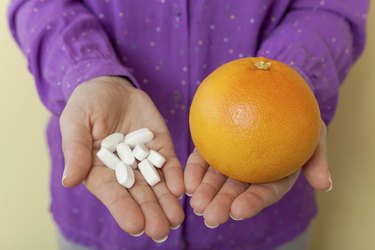
Grapefruit is a healthy addition to your breakfast a great source of vitamin C, which may reduce the risk of some diseases. But this nutritious fruit can interfere with the metabolism of a number of medications, including some antibiotics used to treat certain respiratory, stomach and other infections. If in doubt about your antibiotic and potential interaction with grapefruit, talk with your pharmacist or prescribing provider.
Antibiotics Affected by Grapefruit
Video of the Day
The main group of antibiotics that may be affected by eating grapefruit or drinking grapefruit juice are called macrolides. Commonly prescribed macrolide antibiotics include erythromycin (E-Mycin, Erythrocin), azithromycin (Zithromax, Zmax) and clarithromycin (Biaxin). Macrolides may be prescribed for respiratory infections, such as pneumonia, bronchitis and sinusitis. They are also sometimes used to treat ear or throat infections, acne, tooth abscesses and gingivitis -- an infection of the gums. Azithromycin is also used to treat some sexually-transmitted infections, including chlamydia and gonorrhea.
Video of the Day
How Grapefruit Affects Antibiotics
Enzymes in the intestines break down many types of medicines, including macrolide antibiotics. Chemicals in grapefruit and grapefruit juice block these enzymes and disrupt their function. Because the breakdown enzymes are not functioning properly, the antibiotics stay in your body longer than normal and the level in your bloodstream may become too high. This increases your chance of experiencing side effects from the medication. Eating grapefruit or drinking grapefruit juice can affect antibiotic metabolism for up to 72 hours. The effect on your medications is worst when the juice or fruit is taken with the medicine or up to 4 hours before you take your dose.
Alternatives
If you are on an antibiotic that is affected by grapefruit, you have two choices. You can stop eating grapefruit for the duration of your medication course. Oranges, tangerines, lemons, and berries are all great replacements for grapefruit that also provide that vitamin C (reference 4, introduction).
If you love your grapefruit too much to give up, consult your doctor. There are many types of antibiotics, and not all of them will be affected by grapefruit consumption but only your doctor will be able to tell you what's right for you.
Hidden Sources
Grapefruit is easy to identify when it's in whole fruit form, but the juice can also affect your antibiotics. Worse yet, there are drinks out there with grapefruit juice as a component. An article published in Hospital Pharmacy found 23 drinks with grapefruit in them, five of them which didn't have the word grapefruit in the name! These included some citrus flavored soft drinks.
Other fruits and fruit juices may also need to be curtailed. A study in Drug Metabolism and Disposition (ref 5 January 2006, Drug Metabolism and Disposition) found that grapefruit, black mulberry, wild grape, pomegranate and black raspberry could also cause issues with antibiotics.
- Inhibitory Effects of Fruit Juices on Cytochrome P450 2C9 Activity in Vitro
- Hidden Sources of Grapefruit
- The grapefruit: an old wine in a new glass? Metabolic and cardiovascular perspectives
- Centers for Disease Control and Prevention: 2010 Sexually Transmitted Diseases Treatment Guidelines
- Drug Metabolism and Disposition: Inhibitory effects of fruit juices on cytochrome P450 3A (CYP3A) activity